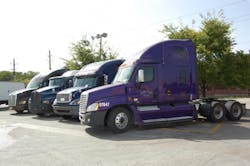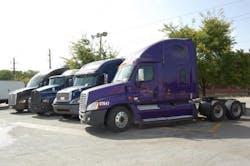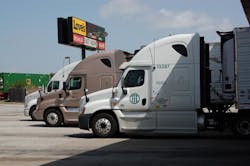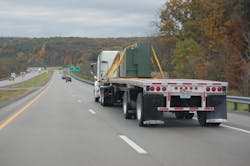[And SmartWay isn’t just about commercial trucks anymore, either, as the EPA added 53-ft. refrigerated trailers to the mix last year.]
Yet perhaps the more important question to be asked regarding SmartWay is what shippers think about it – especially as the program is designed in part to get shippers to reserve freight for compliant carriers.
The ultimate driving force behind the SmartWay program is to help reduce carbon dioxide (CO2) emissions from supply chains – something that’s gained and ever-larger share of the U.S. Department of Transportation’s attention over the years.
But in some ways the concern over CO2 emissions – part of the long-running debate about climate change – is almost beside the point.
For if shippers, the trucking industry’s customers, want to decrease CO2 emissions and thus fuel consumption – and are willing to give motor carriers good paying freight to help them do so – it would be a smart business to examine the SmartWay program closely.
Take Paul Campbell, director of sustainability for mega-retailer Sears. His company has always looked for ways to establish “common ground” in terms of examining emissions and fuel use within Sears’ supply chain. That way, when it comes to measuring, managing, and sharing this information, everyone is on the same page, he explained recently.
“People define ‘green’ in different ways,” Campbell said. “But if you can measure it, you can manage it. [And] SmartWay gives us metrics and data that we all can accept and work with.”From his perspective, SmartWay provides Sears with that common set of data – allowing executives, customers, shareholders, and other stakeholders a trusted source of data they can use to measure the environmental impact of their freight supply chain.
Yet, given how tough it is to secure freight capacity these days, is it worth adding another requirement to the carrier procurement process? In the opinion of Ron Guzzi, senior manager of transportation at The Home Depot, the answer is an emphatic yes.
"In our experience, it is," he stressed. "The values of SmartWay —operating efficiently, sharing information, [and] improving performance in terms of sustainability — are shared values within our company. For us, maximizing our ratio of SmartWay-registered carriers makes sense because it can help us meet our corporate goals for sustainability.”
From Guzzi’s perspective, using the request-for-proposal (RFP) process provides a powerful – and in his view frequently untapped – lever to drive “greener” transport practices.“By including language about registering with EPA's SmartWay Transport Partnership, you can use your RFPs to encourage truck, rail, logistics, and multi-modal carriers to participate in SmartWay and help you quantify your supply chain’s carbon footprint at the same time,” he explained.
Both Campbell and Guzzi provide “checklists” for shippers showing how they can go about getting their outside transportation partners to adopt more “sustainable” practices. Trucking firms should give them a read as well, simply because more and more shippers may be engaging in such efforts down the road.
For starters, Campbell stressed that shippers and transport providers need to understand how to make SmartWay data work for them.
Using a simple Excel spreadsheet, carriers report information to SmartWay about fuel consumption, miles driven, and the type of freight they haul. This produces a measure of their emissions across three types of pollutants: CO2, oxides of nitrogen (NOx) and particulate matter (PM), he said. Those data elements then enable shippers and logistics companies to calculate their carbon footprint.
“These items give us a consistent, well-defined set of data that we can focus on,” Campbell said. “While the data is voluntarily submitted, it undergoes a series of checks to verify its accuracy.”
Shippers then turn around and use SmartWay data in their corporate sustainability studies, carbon disclosure projects, and other public reporting – demonstrating to their customers and stakeholders that they are concerned about environmentally responsible freight transportation.
Yet Campbell also noted that it’s critical to prioritize and weigh emission data accordingly, determining which metrics or combination of metrics matters most:
- CO2 corresponds to fuel use. If reducing fuel consumption in your supply chain is a goal, a carrier’s CO2 score is an important metric to watch.
- Grams per ton-mile of CO2 are indicative of freight efficiency, although shippers that move lighter loads may prefer a metric of grams-per-mile of CO2.
- Shippers that are concerned about smog in a localized area (say, from drayage operations) can examine grams-per-mile of PM.
Finally, in Campbell’s view, it’s important to then let the free market take over.
“Freight carriers in the SmartWay program are grouped into operational categories (flatbed, LTL, refrigerated, etc.) and ranked,” he explained. “SmartWay carrier scores and rankings are posted online and available to anyone—shippers and carriers alike. Knowing that they’re being benchmarked among their peers, carriers are driven to develop more efficient ways to move goods.”Campbell stressed, too, that some shippers will factor SmartWay scores into their decisions about freight contracts – noting that, all other things being equal, Sears will give a best-in-class SmartWay carrier the advantage versus a carrier on the lower end of the spectrum.
“It’s cool to see carriers compete and apply their supply chain expertise in different ways to create economic and environmental benefits for our organization,” Campbell noted – and truckers should note that as well.
Jason Eitel, who manages the prospective carrier process for Best Buy, says his company asks for SmartWay registration right off the bat.
“We no longer ask a carrier, ‘Are you SmartWay-registered, yes or no?’ We ask for its SmartWay registration number so we can determine the extent to which the carrier participates in the program,” he explained.
"In addition to all of the other factors, helping us collect good data and manage sustainability is part of the equation when we evaluate who should handle our freight.”
Home Depot’s Guzzi added that his company thinks it is important to provide an incentive for carriers to participate in SmartWay.
“All other things being equal, The Home Depot's bid program will give a best-in-class SmartWay carrier the advantage,” he pointed out. “Carriers know that if they can improve their standing within SmartWay, it will help them in terms of their potential to win new business.”




